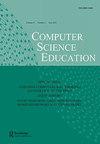The Coding Stages Assessment: development and validation of an instrument for assessing young children’s proficiency in the ScratchJr programming language
IF 2.2
Q1 EDUCATION & EDUCATIONAL RESEARCH
引用次数: 17
Abstract
ABSTRACT Background and Context Despite the increasing implementation of coding in early curricula, there are few valid and reliable assessments of coding abilities for young children. This impedes studying learning outcomes and the development and evaluation of curricula. Objective Developing and validating a new instrument for assessing young children’s proficiency in the programming language ScratchJr, based on the Coding Stages framework. Method We used an iterative, design-based research approach to develop the Coding Stages Assessment (CSA), a one-on-one assessment capturing children’s technical skills and expressivity. We tested 118 five-to-eight-year-olds and used Classical Test Theory and Item Response Theory to evaluate the assessment’s psychometric properties. Findings The CSA has good to very good reliability. CSA scores were correlated with computational thinking ability, demonstrating construct validity. The items have good discrimination levels, and a variety of difficulty levels to capture different proficiency levels. Younger children tended to have lower scores, but even first graders can achieve the highest coding stage. There was no evidence of gender or age bias. Implications The CSA allows testing learning theories and curricula, which supports the implementation of Computer Science as a school subject. The successful remote administration demonstrates that it can be used without geographical restrictions.编码阶段评估:开发和验证一种工具,用于评估幼儿对ScratchJr编程语言的熟练程度
摘要背景和背景尽管编码在早期课程中的应用越来越多,但对幼儿编码能力的有效和可靠评估却很少。这阻碍了学习成果的研究以及课程的制定和评估。目的基于编码阶段框架,开发并验证一种新的评估幼儿编程语言ScratchJr熟练程度的工具。方法我们使用迭代的、基于设计的研究方法来开发编码阶段评估(CSA),这是一种一对一的评估,捕捉儿童的技术技能和表达能力。我们测试了118名5至8岁的儿童,并使用经典测试理论和项目反应理论来评估评估的心理测量特性。调查结果CSA具有良好到非常好的可靠性。CSA得分与计算思维能力相关,证明了结构的有效性。这些项目具有良好的辨别能力,并有各种难度级别来捕捉不同的熟练程度。年龄较小的孩子往往得分较低,但即使是一年级学生也能达到最高的编码阶段。没有证据表明存在性别或年龄偏见。含义CSA允许测试学习理论和课程,这支持将计算机科学作为一门学校科目的实施。成功的远程管理表明,它可以在没有地域限制的情况下使用。
本文章由计算机程序翻译,如有差异,请以英文原文为准。
求助全文
约1分钟内获得全文
求助全文
来源期刊

Computer Science Education
EDUCATION & EDUCATIONAL RESEARCH-
CiteScore
6.90
自引率
3.70%
发文量
23
期刊介绍:
Computer Science Education publishes high-quality papers with a specific focus on teaching and learning within the computing discipline. The journal seeks novel contributions that are accessible and of interest to researchers and practitioners alike. We invite work with learners of all ages and across both classroom and out-of-classroom learning contexts.
 求助内容:
求助内容: 应助结果提醒方式:
应助结果提醒方式:


